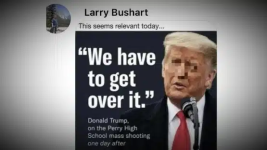Here’s a breakdown of the key parties involved:
- Lexington Police Department initiated contact with Bushart on September 21, 2025, after a teacher reported the meme. An officer visited his home, asked him to remove the post, and warned that refusal could lead to arrest.
- Bushart refused to delete the post, citing free speech.
- Perry County Sheriff’s Office, led by Sheriff Nick Weems, then took over. Weems interpreted the post as a veiled threat under Tennessee’s 2024 school threat law (T.C.A. § 39-17-1501), which allows felony charges for communications that cause reasonable fear of violence at a school.
- Weems obtained an arrest warrant, and deputies executed it later that night at Bushart’s home in Henderson County.
- A Perry County judge approved the warrant and set the initial $2 million bond—an unusually high amount that drew widespread criticism.
While Weems made the final call to pursue charges and was the public face of the case, the arrest involved coordination between:
- A concerned citizen/teacher who reported it
- Lexington PD (initial response)
- Perry County Sheriff’s Office (investigation and arrest)
- The judicial system (warrant and bond)
Weems later admitted in interviews that the meme contained no explicit threat, but argued the context, posting it in a local group after a national assassination and during a school vigil, justified action to prevent potential violence.
The district attorney’s office cited insufficient evidence to prove the meme constituted a "true threat" under First Amendment standards (see
Virginia v. Black, 2003, and
Watts v. United States, 1969). The post was ruled political satire, not a credible threat.
The charges were dropped, and Larry Bushart was released after 37 days in jail. The $2 million bond was vacated.
He is now seeking damages in civil court.
This case does not prove that free speech is under systematic attack. It does expose one troubling instance of overreach by local authorities.
One case, even a high-profile one, is not evidence of a systematic assault on free speech across the board.
It reflects:
- Poor judgment by a sheriff under pressure.
- Vague application of a 2024 Tennessee law meant to deter school shootings.
- Community panic after a national assassination and local tensions.
These are local failures, not proof of a coordinated national campaign against expression.
Free speech remains robust in the U.S., protected by courts, defended by advocacy groups, and exercised daily on and offline.

